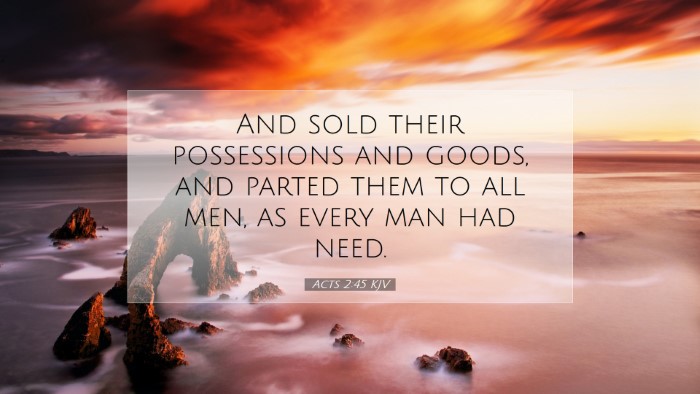Commentary on Acts 2:45
Bible Verse: "And sold their possessions and goods, and parted them to all men, as every man had need." (Acts 2:45)
Introduction
The early church, as described in the Book of Acts, illustrates a powerful model of communal living and sharing among believers. Acts 2:45 serves as a pivotal verse that captures the essence of the early Christian community's response to God’s grace and the gospel's transformative power. This commentary synthesizes insights from various public domain commentaries to provide a comprehensive understanding of this verse.
The Context of Acts 2
To fully grasp the significance of Acts 2:45, it's important to consider the wider context in which it is situated. Following the outpouring of the Holy Spirit on the Day of Pentecost, a remarkable change occurred among Jesus' followers. They were empowered to boldly proclaim the gospel, leading to the conversion of thousands, as recorded just prior to this verse.
As Matthew Henry notes, the church grew in number and unity, marked by a shared experience of God’s presence and the fellowship of believers. This unity prompted a deep sense of community responsibility towards one another, as they sought to embody the teachings of Christ.
Analysis of Acts 2:45
Community and Generosity
Acts 2:45 highlights two key actions: selling possessions and distributing the proceeds. This practice reflects an extraordinary level of commitment to community needs. Albert Barnes points out that the believers were not compelled by law but acted out of love and brotherhood, recognizing the pressing needs within their community.
This communal sharing is not merely about economic transactions but indicates a deep relational network that transcends typical societal boundaries. Adam Clarke emphasizes that such acts of generosity were integral to the church’s life, serving both the individual and collective well-being.
Voluntary Act of Sharing
It is crucial to understand that the actions taken by the early Christians were voluntary. They sold their possessions and goods, indicating a willing heart, motivated by compassionate love and the desire to help fellow believers. This is not a mandated practice but rather a voluntary expression of faith—a concept echoed by Matthew Henry, who interprets this as a profound manifestation of the love of Christ within the community.
Theological Implications
Acts 2:45 serves as a theological cornerstone for understanding Christian stewardship and community life. It raises important questions about Christian responsibility and the nature of ownership. According to Barnes, this instance challenges believers today to reflect on their material possessions in light of the needs of others.
The act of sharing possessions can be seen as a profound statement of faith, aligning with the teachings of Christ on generosity and selflessness. Clarke asserts that this model should inspire modern believers to cultivate a spirit of giving and support within their own communities.
Practical Applications
For pastors, students, and theologians, Acts 2:45 provides a practical guide for fostering community and accountability in church life. Here are several key takeaways:
- Emphasize Community: Encourage congregations to build strong, supportive relationships that go beyond superficial interactions.
- Promote Generosity: Teach and model generous living, demonstrating how individual resources can bless the community.
- Encourage Mutual Aid: Create platforms within churches for sharing needs and resources, allowing for the proper distribution that aligns with the needs of individuals.
- Foster a Culture of Openness: Just as the early church had an open sharing of their lives, encourage transparency and openness regarding needs and resources among members.
Conclusion
Acts 2:45 encapsulates the essence of Christian community life, characterized by generosity, shared responsibility, and mutual support. Drawing from the insights of Matthew Henry, Albert Barnes, and Adam Clarke, it becomes clear that the early church's commitment to one another was not a temporary zeal but rather a sustainable lifestyle motivated by their faith in Christ.
This passage not only challenges individual believers to rethink their approach to possessions and community but also calls the church as a whole to model its communal life after the radical example set by the early Christians. As we strive to embody these principles today, may we be transformed and empower others through our acts of love and generosity.


